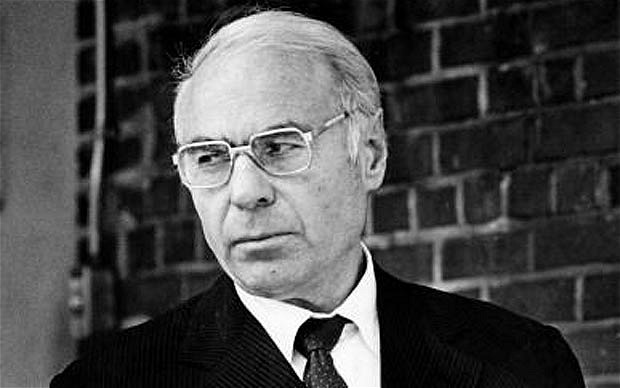
Edwin Wilson
The Telegraph
Edwin Wilson, who has died aged 84, portrayed himself as the American spy left out in the cold after being branded a traitor and jailed for running arms and explosives to Libya in the years before the Lockerbie bomb. He insisted, however, that the undercover arms deals were done for, and with the knowledge of, his country.
No one disputed that Wilson had spent his working career, from 1955 to 1971, as a CIA agent. But furious debate surrounded his precise status afterwards. For it was in apparent retirement that Wilson set himself up in the international weapons trade, establishing a host of companies in the United States and Europe. The millions he earned bought him luxury properties in Switzerland, America and Britain, and not one but three private planes. He clad the mistress he called “Wonder Woman” in furs, and entertained congressmen, top military brass and senior CIA officials at his sprawling farm in Virginia.
He also spent a great deal of time in Libya, But his high-flying, lifestyle imploded in 1982 when he was lured out of the country in a “sting” operation carried out by his erstwhile colleagues at the CIA. Arrested on charges of having gone “rogue” and shipping 20 tons of powerful C-4 plastic explosive to the Gaddafi regime, he was returned to the United States. Apart from the C-4, prosecutors there said, Wilson had also organised elite military veterans, including US Army Green Berets, to train crack units in Gaddafi’s regime which then assassinated Libyan dissidents in the United States and Germany.
At his trial the following year, Wilson insisted that in 1977, when the huge shipment of explosives was made (just 250 grams of plastic explosive can bring down a commercial airliner), he had still been working for the CIA. The government in Washington, however, denied that the CIA had any contacts with him at the time. Largely on the strength of this assurance, Wilson was sentenced to 52 years. But in 2004, after more than two decades in jail, Wilson and his lawyers convinced a federal judge that the government had told “a pack of lies”, and his conviction was overturned. “America will not defeat Libyan terrorism by double-crossing a part-time informal government agent,” the ruling noted.
In 1993 a book, Trail Of The Octopus, by Lester Coleman (a disgruntled former agent for the US Defence Intelligence Agency), alleged that far from acting as a lone, rogue agent in Libya, Wilson’s deals had been part of an operation to get close to Col Gaddafi, gleaning intelligence all the while, on behalf of the CIA. The price for doing so, the book suggested, was that the spy agency for a decade provided Gaddafi with explosives and training – of the kind essential, for example, to building and planting a bomb on a commercial airliner such as Pan Am Flight 103, which exploded over Lockerbie in 1988, killing 270 people.
Edwin Paul Wilson was born on May 3 1928 into a poor farming family in Idaho. Having worked as a merchant seaman, and graduated in Psychology at the University of Portland in 1953, he joined the US Marines and saw action in the closing days of the Korean War. On his discharge, he went to work for the CIA in 1955.
He admitted that after leaving the spy agency, his years in the arms trade had furnished him with a lavish lifestyle. “I had a couple of villas that were very, very nice,” he told the Washington Post in 2004. “I had Pakistani houseboys and I had Libyans working for me, typing up proposals in Arabic.”
After his arrest and trial, a federal court in Virginia convicted Wilson of illegally exporting firearms to Libya and sentenced him to 10 years. Another court in Texas handed him a 17-year sentence for similar crimes. A third court, in New York, sentenced him to a further 25 years, to run consecutively, for attempted murder, criminal solicitation and other charges involving claims that Wilson conspired – while in custody – to have witnesses, prosecutors and even his own wife, Barbara, killed.
In prison, Wilson spent years in solitary confinement trying to prove that he had been framed by the US government, and used the Freedom of Information Act to access official documents that he believed would clear his name. Eventually he found what he was looking for: internal records suggesting that the CIA had been in touch with him at least 80 times during the 1970s, many of those times close to the arms deals for which he had been locked up.
On his release, Wilson filed a civil lawsuit against seven former federal prosecutors and a former executive director of the CIA, but a judge in Texas dismissed the case in 2007. Though his conviction for explosives trafficking was quashed, other convictions against him still stood, including one of trying to hire a hit man from prison to murder the federal prosecutor, something that Wilson denied. At liberty, the former jet-setter was forced to eke out his social security benefits in a room rented from his brother. “Even McDonald’s wouldn’t hire me,” he recalled.
His campaign to restore his good name was not easy. During his career he had not aspired to amiability or morality. Rather, he said, he was simply serving his country. But even this boast won him few sympathisers. “The problem is Ed is not a perfect soul,” remarked one reporter. “He was crooked in his heart.”
Edwin Wilson’s two sons survive him.
http://www.telegraph.co.uk/news/obituaries/politics-obituaries/9574988/Edwin-Wilson.html

